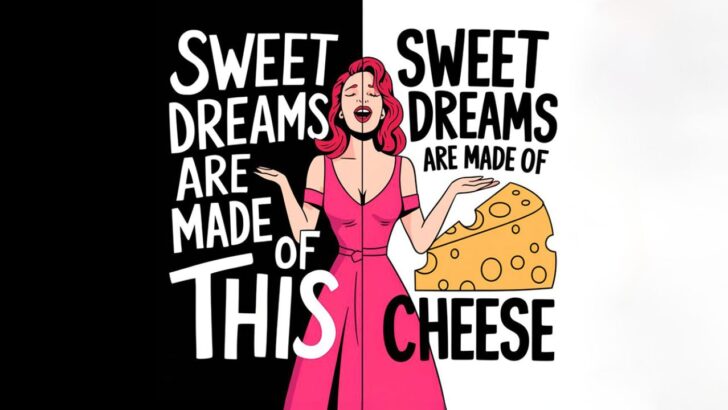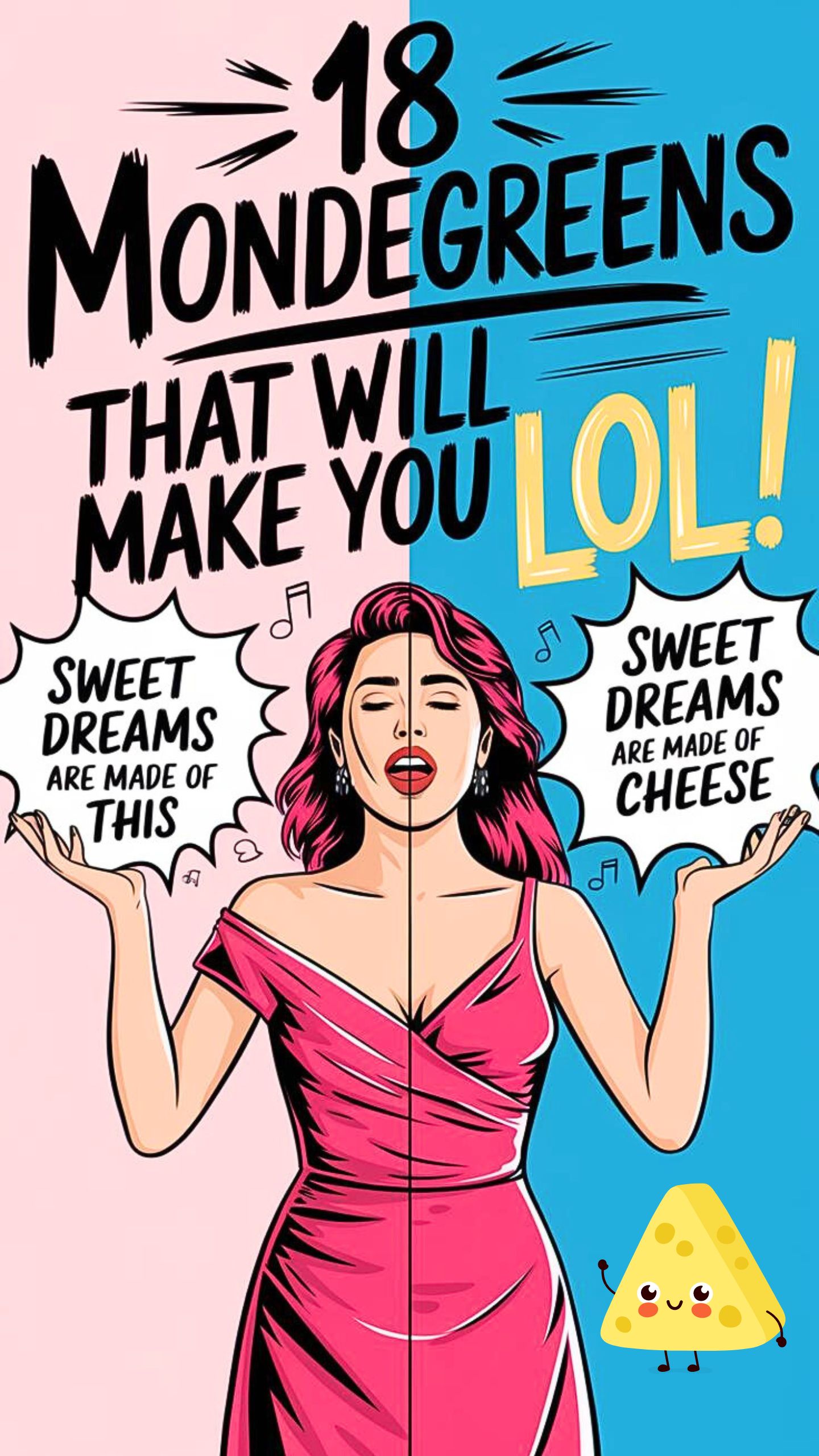You know that moment when you’re singing your heart out to a favorite song, only to realize the lyrics you’ve been passionately belting out for years are completely wrong? You’re not alone in this lyrical mix-up; in fact, there’s a term for it: mondegreens.
From “Hold me closer, Tony Danza” instead of “Tiny Dancer” to Jimi Hendrix’s “kiss this guy” rather than “kiss the sky,” these misheard lyrics add a layer of unintended comedy to our musical experiences. Mondegreens aren’t just about faulty hearing—they reveal some interesting aspects of language and how our brains interpret what we hear.
What Exactly Is a Mondegreen?
A mondegreen is what happens when we mishear a word or phrase, often in songs, poems, or speeches, and interpret it as something entirely different—usually with unintentionally funny results. Picture yourself at a concert, singing along confidently, only to find out later you’ve been singing nonsense. These misunderstandings occur because our brains are constantly working to make sense of what we hear, even if what we hear isn’t exactly clear.
While mondegreens are about mishearing words based on unclear sounds, they’re somewhat related to the McGurk effect, where what we see influences what we hear. In the McGurk effect, visual and auditory information conflict, tricking the brain into “hearing” something that wasn’t said. Both phenomena show how our brains can reshape reality based on context, whether it’s filling in gaps in a song lyric or reconciling mismatched sensory inputs.
Mondegreens aren’t just limited to songs; they can pop up in poetry, conversations, or any situation where language isn’t fully understood. They remind us of how our perception can play tricks on us and how easily language can twist into something new and unexpected.
The Origin of the Term “Mondegreen”
The word “mondegreen” has an origin story almost as amusing as the misheard lyrics it describes. It was first coined by author Sylvia Wright in 1954, inspired by a childhood memory of mishearing a line from a 17th-century Scottish ballad. In the song, the lyric “They have slain the Earl of Moray and laid him on the green” was, to young Sylvia, “They have slain the Earl of Moray and Lady Mondegreen.” Of course, there was no Lady Mondegreen, but her version of the lyric became so memorable that it eventually gave a name to this phenomenon.
Mondegreens show us just how inventive our minds can be when trying to make sense of muddled language. Sylvia Wright’s playful naming of this experience has given us a term that perfectly captures those moments when what we hear becomes something entirely different from what was said. Since then, the term has been widely used to describe all sorts of amusing misinterpretations in music, poetry, and conversation.
Why Do Mondegreens Happen?
Mondegreens are a product of how our brains process language and sound, especially when the input isn’t crystal clear. When we hear a phrase that’s muddled by music, background noise, or an unfamiliar accent, our brains jump into action, trying to piece together what makes the most sense based on familiar sounds and context. This tendency to fill in the gaps is a natural part of human cognition and can lead to some surprisingly funny outcomes.
From a psychological perspective, our brains are wired to recognize patterns and create meaning, even when faced with incomplete or ambiguous information. If a lyric or phrase doesn’t immediately make sense, our minds substitute something more familiar, even if it’s a bit off. This is similar to how optical illusions work, but in the realm of language.
From a linguistic angle, the misinterpretation often arises from homophones (words that sound the same but have different meanings) or near-homophones. Our ears might catch the rhythm and cadence of a song but not every word, so the brain supplies the most logical—or sometimes the most hilariously illogical—words that fit.
In the same way that the McGurk effect demonstrates how our brains reconcile conflicting visual and auditory information, mondegreens show how our minds strive to make sense of what we hear, even if it means creating a whole new (and unintended) meaning.
Famous Examples of Mondegreens in Songs
Mondegreens are everywhere, especially in music. Some of these misheard lyrics have become almost as famous as the original ones. Here are a few classic examples that have amused listeners over the years:
- Jimi Hendrix – “Purple Haze”
Misheard: “Excuse me while I kiss this guy.”
Actual: “Excuse me while I kiss the sky.” - Elton John – “Tiny Dancer”
Misheard: “Hold me closer, Tony Danza.”
Actual: “Hold me closer, tiny dancer.” - Creedence Clearwater Revival – “Bad Moon Rising”
Misheard: “There’s a bathroom on the right.”
Actual: “There’s a bad moon on the rise.” - ABBA – “Dancing Queen”
Misheard: “See that girl, watch her scream, kicking the dancing queen.”
Actual: “See that girl, watch that scene, diggin’ the dancing queen.” - The Beatles – “Lucy in the Sky with Diamonds”
Misheard: “The girl with colitis goes by.”
Actual: “The girl with kaleidoscope eyes.” - Eurythmics – “Sweet Dreams”
Misheard: “Sweet dreams are made of cheese.”
Actual: “Sweet dreams are made of this.” - Bon Jovi – “Livin’ on a Prayer”
Misheard: “It doesn’t make a difference if we’re naked or not.”
Actual: “It doesn’t make a difference if we make it or not.” - Adele – “Chasing Pavements”
Misheard: “Should I give up, or should I just keep chasing penguins?”
Actual: “Should I give up, or should I just keep chasing pavements?” - The Clash – “Rock the Casbah”
Misheard: “Rock the cat box.”
Actual: “Rock the Casbah.” - Queen – “Bohemian Rhapsody”
Misheard: “Beelzebub has a devil for a sideboard.”
Actual: “Beelzebub has a devil put aside for me.”
These examples show how easy it is to misinterpret lyrics, especially when they’re surrounded by loud music, unclear enunciation, or just an unexpected choice of words. Mondegreens have become a part of pop culture, adding humor to our listening experiences.
Famous Mondegreens Beyond Music
While mondegreens are often associated with songs, they also appear in poetry, literature, and even everyday conversation. Here are some well-known examples that show how easily our minds can twist language into something entirely different:
- The Scottish Ballad – “The Bonny Earl of Murray”
Misheard: “They have slain the Earl of Moray and Lady Mondegreen.”
Actual: “They have slain the Earl of Moray and laid him on the green.”
This is the original mondegreen that gave the phenomenon its name. Sylvia Wright’s mishearing of this line from a 17th-century ballad led to the coining of the term “mondegreen.” - The Lord’s Prayer
Misheard: “Lead us not into Penn Station.”
Actual: “Lead us not into temptation.”
This humorous misinterpretation has popped up in various contexts, often bringing a modern twist to the classic prayer. - The Pledge of Allegiance (USA)
Misheard: “I pledge allegiance to the flag… and to the republic for witches stand.”
Actual: “I pledge allegiance to the flag… and to the republic for which it stands.”
Children learning the Pledge of Allegiance often hear it this way, imagining something quite different from the intended meaning. - Common Phrases and Proverbs
Misheard: “Old-timers’ disease.”
Actual: “Alzheimer’s disease.”
This misinterpretation of a medical term creates a surprisingly apt, if unintentional, pun about aging. - Shakespeare’s “Macbeth”
Misheard: “Out, out damn spot!” (referring to a dog or a stain)
Actual: “Out, out, damned spot!” (referring to a bloodstain in Lady Macbeth’s guilt-ridden hallucinations)
Some people unfamiliar with the play’s context have misinterpreted this famous line. - Children’s Rhymes
Misheard: “Round John Virgin, mother and child.”
Actual: “Round yon virgin, mother and child.”
In the Christmas carol “Silent Night,” this mondegreen creates a hilarious visual of a person named John Virgin. - Everyday Expressions
Misheard: “Rest in peace and quiet.”
Actual: “Rest in peace and quiet.”
The humor here lies in how people might interpret the phrase. Some think it combines “rest in peace” (used in obituaries) with “peace and quiet” (meaning calmness), leading to an unintended and funny meaning. - Common Idioms
Misheard: “For all intensive purposes.”
Actual: “For all intents and purposes.”
This is a common error where the original phrase gets rephrased in a way that sounds plausible but doesn’t quite match the intended meaning.
These examples illustrate that mondegreens are not just a musical phenomenon; they can happen anytime we try to make sense of language that isn’t entirely clear. From ballads to biblical verses to everyday expressions, our brains love to play these little tricks on us.
The Impact of Mondegreens on Culture and Language
Mondegreens aren’t just funny misunderstandings; they also have a way of creeping into our culture and even influencing the way we use language. Some misheard phrases have become so widespread that they’ve entered the collective consciousness, often becoming jokes, memes, or shorthand references that everyone recognizes.
In Pop Culture
Many mondegreens from famous songs have taken on lives of their own. For instance, “There’s a bathroom on the right” (instead of “There’s a bad moon on the rise” by Creedence Clearwater Revival) is so well-known that even the band members have joked about it. These misinterpretations often show up in parodies, comedy sketches, and internet memes, further embedding them into popular culture.
Language Evolution
Some mondegreens have contributed to the natural evolution of language. As misheard phrases become popular, they sometimes evolve into new idioms or expressions. For example, “for all intensive purposes” is a mondegreen that’s been mistaken so often that some people now use it as if it were the original phrase.
Bonding Through Laughter
Mondegreens also serve as a fun way for people to connect. Discovering that someone else has been singing the wrong lyrics or misinterpreting a well-known phrase for years can be a hilarious shared experience. This common ground can lead to bonding over these funny linguistic slips and even spark conversations about language and perception.
Across Generations and Languages
Mondegreens are a universal experience. Whether in English, French, Japanese, or any other language, everyone mishears things occasionally. In multilingual contexts, they can even occur more frequently, as listeners grapple with unfamiliar sounds. This cross-linguistic appeal makes mondegreens a charming way to show how, despite language barriers, humans everywhere experience the same delightful misunderstandings.
By blending humor with language and psychology, mondegreens remind us of the creative ways our minds work. They reflect not only our attempts to make sense of the world but also how we adapt and play with language, turning errors into something uniquely memorable.
Singing Loud, Singing Proud… Even If It’s Wrong!
Mondegreens prove that the human brain is a wonderfully creative machine, always ready to fill in the blanks—even if it means turning “kiss the sky” into “kiss this guy.” They remind us that language isn’t always about getting it right; sometimes, it’s about the joy of getting it hilariously wrong. Whether you’re accidentally rocking out to a non-existent “Tony Danza” or pledging allegiance “for witches stand,” these mix-ups offer a shared laugh and a sense of connection that transcends languages, generations, and music genres.
So next time you find yourself in a moment of lyrical confusion, embrace it. Belt it out. After all, in a world where “Sweet dreams are made of cheese,” who are we to argue with a little bit of creative mishearing? And who knows? Your next mondegreen might just be the newest addition to the ever-growing list of iconic misheard lyrics!
Now, go ahead—sing loud, sing proud, and remember: sometimes it’s not about the lyrics, but the laughter along the way.

Hey fellow Linguaholics! It’s me, Marcel. I am the proud owner of linguaholic.com. Languages have always been my passion and I have studied Linguistics, Computational Linguistics and Sinology at the University of Zurich. It is my utmost pleasure to share with all of you guys what I know about languages and linguistics in general.


